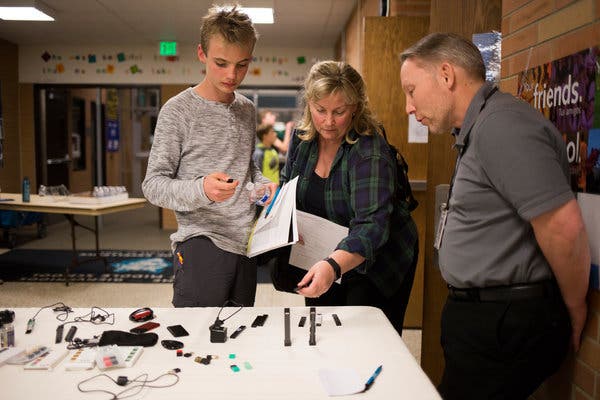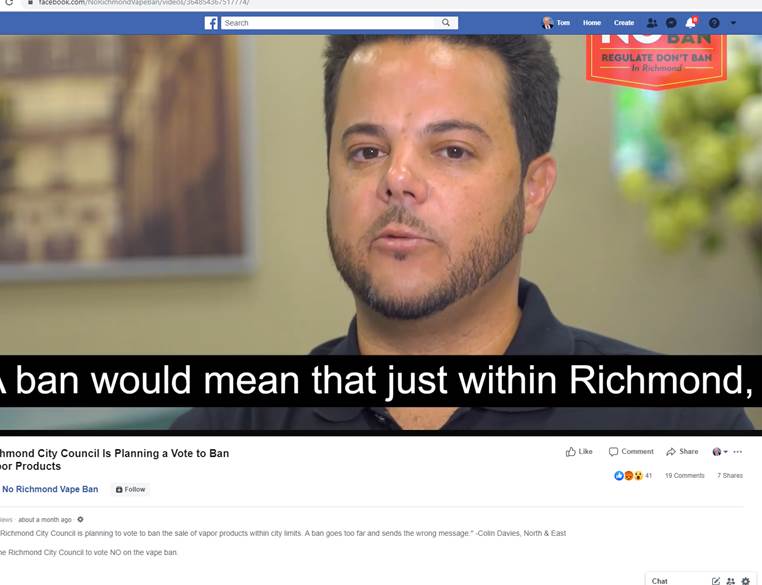|
| As the City Council is poised to vote tonight on the second reading of an ordinance that further regulates the sale of vaping products in Richmond, I am finding continuing evidence that Juul found Richmond a potentially lucrative market and invested heavily in selling Juul products in our city, including to our young people.
On September 9, 2019, the GDA wrote a letter (https://www.fda.gov/media/130604/download) to Kevin Burns, CEO of Juul labs, Inc., that expressed deep concern about Juul’s I am writing to request documents and information from JUUL Labs, Inc. (JUUL) regarding JUUL’s marketing, advertising, promotional, and education campaigns, as well as certain product development activity. As we have previously communicated to you and your firm, the Food and Drug Administration (FDA) is deeply concerned by the epidemic rate of increase in youth use of electronic nicotine delivery system (ENDS) products as well as the uncertainty regarding their immediate and long-term effects on the public health. Despite commitments JUUL has made to address this epidemic, JUUL products continue to represent a significant proportion of the overall use of ENDS products by children. We believe you have a continuing responsibility to take action to address the epidemic of youth use of your products, some of which appears to have been a direct result of your product design and marketing campaigns, whether or not some of these practices have been discontinued.
We were particularly troubled by recent testimony provided to the Subcommittee on Economic and Consumer Policy of the Committee on Oversight and Reform of the United States House of Representatives (“Subcommittee”) during a hearing entitled , “Examining JUUL’s Role in the Youth Nicotine Epidemic” on July 24-25, 2019. As detailed further below, that testimony revealed JUUL engaged in a wide variety of promotional activities and outreach efforts to persuade potential customers, including youth, to use JUUL products. Witnesses testified, for example, that JUUL advertising saturated social media channels frequented by underage teens and that JUUL used influencers and discount coupons to attract new customers.
We are also concerned that parts of the “Make the Switch” campaign may also convey that switching to JUUL is a safer alternative to cigarettes, in that using JUUL products poses less risk or is less harmful than cigarettes. Further, FDA believes that the hearing testimony regarding JUUL’s “Switching Program” presentation to the Cheyenne River Sioux Tribe Health Committee may help inform the message that JUUL intends to convey in the “Make the Switch” campaign.
As we already know, Jull provided a $89,000 grant to the Richmond police Activities League (Hearing, July 24, 2019, Testimony of Ms. Meredith Berkman, at minutes 53:58 – 54:13 (https://youtu.be/m3iEMrAd83o).) for “its youth prevention curriculum in the RPAL youth program, which is for 12-to 17-year -olds who face suspension from school for using e- cigarettes, Ms. Gould testified that JUUL ended its youth prevention program.”
Although the program has been characterized as a diversion program, the intent of Juul is to build their brand among youth. RPAL CEO Larry Lewis confirmed the grant but said, “We'll have our next cohort of students in September for the Diversion Program. The part that is not true is teaching a JUUL Lab curriculum to middle and high school students who face suspension for using cigarettes. We did not agree to do that work.”
We all remember former WCCUSD Superintendent Bruce Harter, who along with Wendell Greer, went to work for Juul designing and selling curricula to public schools. See https://www.ktvz.com/health/how-juuls-plan-to-teach-students-about-vaping-went-up-in-smoke/842249022.
The Stanford and Spokane resources appeared in a December company memo outlining Juul's plans, which included "designing alternatives to traditional prevention programs" by culling from "best practice resources."
A Juul Labs spokeswoman, Victoria Davis, confirmed that the memo was a company document.
Also noted in the December memo is the progress the initiative had made: It had contacted 15 school districts in California, committed two schools to the program and engaged "long-time educational leaders Wendell Greer and Bruce Harter to lead the prevention effort in schools and school districts."
Harter and Greer did not immediately respond to requests for comment. They served together as administrators of California's West Contra Costa Unified School District; Harter was its superintendent.
Emails show that Harter attended a meeting in February to promote the Juul program at California's Tobacco Education and Research Oversight Committee. Meeting minutes show that Harter was there in person and Greer via teleconference.
The following day, health and education experts privately expressed concern about Juul's plans. One doctor described as "problematic" the company's plans to set up focus groups of student vapers:
"It's analogous to Philip Morris' research on kids they did under the guise of youth smoking prevention," wrote Dr. Pamela Ling, a professor of medicine at University of California, San Francisco who works with the school's Center for Tobacco Control Research and Education.
On Jan. 23, The Boulder Daily Camera published a front-page story about the growing concerns of local educators in Colorado about student use of Juuls.
Five days later, Carrie Yantzer, the principal at Nederland Middle-Senior High School, received an email that immediately struck her as suspicious. The writer introduced himself as Bruce Harter, a former educator working with Juul to develop an anti-vaping curriculum for schools.

A presentation of various vape devices that were confiscated from students at a school in Boulder, Colo., in March. In January, the Colorado school system had received an offer from a former educator working with Juul to develop an anti-vaping curriculum.CreditNick Cote for The New York Times
[Here’s why public health experts believe vaping may lure teenagers into smoking.]
“I read about the challenges you’re having with Juul,” Mr. Harter wrote. He offered a free, three-hour curriculum provided by Juul to discourage teens from using e-cigarettes by teaching them about their brains and giving them mindfulness exercises.
“What we’ve found from focus groups with teenage Juul users is that young people don’t understand the dangers of nicotine addiction,” the letter read. “They sometimes feel ‘pushed’ by friends to use e-cigarettes. We also found that they don’t have operative ways to deal with stress and the emotional ups and downs of their lives right now.”
Ms. Yantzer was angry. “It sounded preposterous,” she said, and the company “deceptive.”
She wasn’t the only school administrator to get such a letter. The Boulder school district and, ultimately, the state of Colorado condemned the offer as a brand-building exercise that was tone-deaf at the very least.
“The way we see this is a fox guarding the henhouse,” said Alison Reidmohr, tobacco communications specialist for the Colorado Department of Public Health. “A company that stands to profit from, and currently profit off, youth using a product can’t be trusted to prevent use of this product.”
Ashley Gould, Juul’s chief administrative officer, said the company, because it has not built management around former tobacco-industry employees, was unaware the tactic had been used by cigarette companies. However, Juul’s board of directors includes experienced investors, including Nicholas Pritzker, a billionaire whose family controlled one of the country’s largest chewing tobacco companies, Conwood, which was acquired in 2006 by Reynolds American for $3.5 billion.
For its part, Juul said it was still deciding what to do with that school program. Ms. Gould said the company did not realize the curriculum would offend or that the idea harked to a tactic big tobacco companies used decades ago. “We didn’t know,” she said. “We should’ve known.”
Juul is now spending heavily in Richmond with billboards and ads on social media against the proposed ordinance.

|

